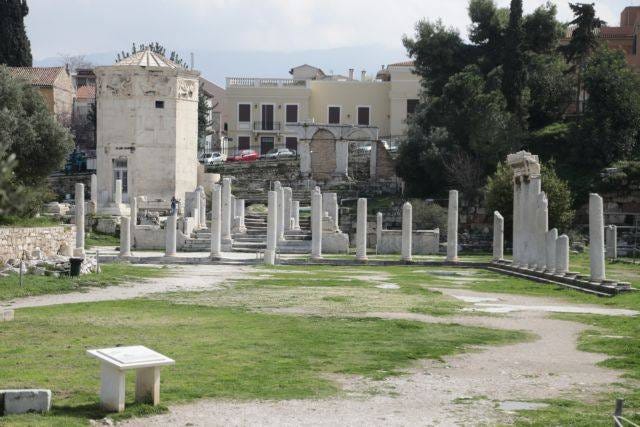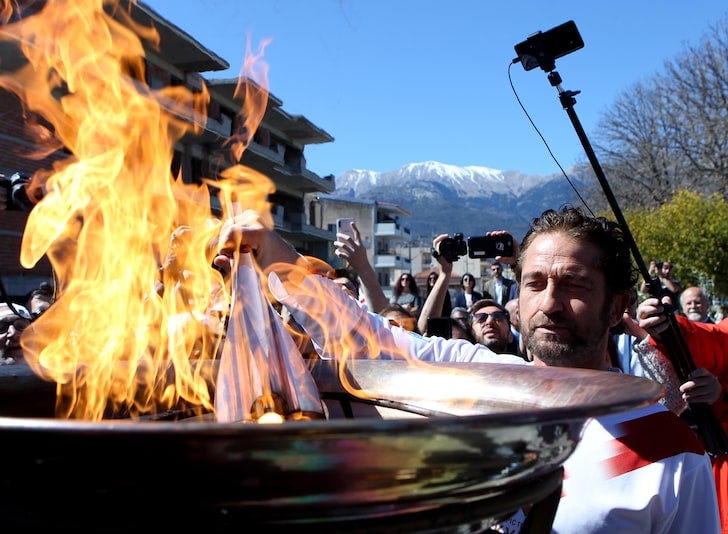Παράξενες Νύχτες στην Ακρόπολη — Strange Nights On The Acropolis

And suddenly everyone’s lives have changed in the most unexpected manner. Forever? Who knows. Let’s hope just for the time being. Things taken for granted are now expectations or wishes. Liberties, like walking down the street or staring at the waves of the open Mediterranean sea, down in Pirea, are limited, if not banned. These are weird days and nights on the Acropolis.
I think of the novel of Nobel Prize Laureate Georgios Seferis, Six Nights on the Acropolis, a mystical saga of sexual liberty and maturation, that is played out in the streets, tavernas and brothels of Athens. Athens in the novel is packed with poor refugees from the Asia Minor Catastrophe of 1922. Similar surreal nights seem to have occurred in Greece amidst the outbreak of the COVID-19 pandemic. Today, Athens is packed with refugees again; but brothels as well as tavernas have all been shut down. “Ζούμε ιστορικές στιγμές,” a friend said, from New York. We do, indeed, live in historical moments. This spring shall be a milestone for generations that will come after.

The weird nights at the Acropolis occurred after the closure, on Friday the 13th, of all museums and archaeological sites, including the entire Acropolis, at least until the end of this month (which has arrived). Then, shopping mall, cafes, hairdressers, everything was shut down as Greece had 117 confirmed cases and one fatality. Today, numbers have risen, as expected. 28 dead, amongst whom was one healthy 42-year-old German Lecturer of Environmental Physics. His most cited paper? “Megacities as hot spots of air pollution in the East Mediterranean”… Confirmed cases in Greece are now over one thousand.

On the Archaeological Ministry front, even though we would have expected the sites to open by April 1st, it seems this will not happen. The Central Archaeological Council of Greece, a very firm and hard to convice council, went to a teleconference format last week. The Fund for Archaelogical Proceeds, two days before the Celebration of the Greek Revolution, as part of “Stay home” campaign, announced free access to expensive books and exhibitions catalogues, from its website, because Τώρα που μένουμε σπίτι, ας σερφάρουμε στον πολιτισμό μας! “Now that we stay home, let’s surf (serpharoume) our civilisation!”
So, if you are interested to see the slopes of the Acropolis, or missed the great exhibition Odysseys or are searching for The Countless Aspects of Beauty (exhibits of the beautiful National Archaeological Museum), you can access them for free. Because it seems that the lockdown in Europe and Greece shall go on for some time.
The image of the empty Sacred Rock of Athena on these sunny spring days does look strange to everyone. Weird. Nonetheless, considering the current situation globally, it gives hope for survival. We will stay healthy and visit the Sacred Rock again, not scared, but happy and safe.
A group, probably the last student group for this spring season to travel the archaeological sites of Greece for 2020, visited the Acropolis last Friday. The site was not empty but not crowded, very few were visiting, mostly families. Then, all those few were called out of the sites; everything was shutting down.
The Greek economists have expressed concern about the shutting down of the archaeological sites. Besides the fact that the Roman Agora or the Theatre of Dionysus look dystopian when found so empty, Greece needs the tourist income. Some locals have a different opinion. Soula, 59, a local living int the Thission area, right across the Athenian Agora, declares, “I prefer it now, as is; empty! People are just marching through in swarms, causing loud noise. This is a beautiful neighborhood and we have lost our peace over the last years with the huge tourism wave! We need to live in harmony and balance!”
Though this aspect might be true, all the tour cancellations have already had a massively negative impact on the economy of Greece. The state has announced that there will be a fund for those whose jobs are at risk, but it is common knowledge that many work undeclared, without any health insurance and were only waiting for the summer season to make a living for the whole year. Last year more than 33 million visitors visited Greece. Unfortunately, although the land is fertile, because of the law and limitations imposed by the European Union, it is complicated to try to grow food here in Greece. There have been funds from the E.U. for past crops to be just thrown away by farmers. Lately, though, with the COVID-19 lockdown, the E.U. is also facing the long-term possibility of blocking Greece’s borders and therefore breaking of the food chain across borders.
This has left tourism as the single alternative for an economy which has already suffered on the global markets. The markets, of course, are affected by all the massive cancellations. And this will, eventually, affect the locals. Will it make them turn to agriculture? But if you have no property and live in a modern city like Athens, how can you turn to agriculture?

In the meantime, the Hellenic Olympic Committee (also on Friday the 13th), made a public announcement suspending the rest of the Olympic Torch relay, because of fears for the spread of the Coronavirus.
The Olympic Flame is actually not an ancient custom, but a tradition started in 1928 in Amsterdam. It became a relay at the Berlin Olympics of 1936. “Therefore we do not need such a tradition!” argues Eleni, a resident of Olympia. “This country resisted Nazism! And also the whole dress up ceremony is absolutely kitsch! ” This may be true for some, but the symbol of the Olympic Flame has long been disentangled from any association with the Nazi regime for most people. And there was a progressive first in this 2020 Olympic Torch relay, in the archaeological site of Olympia. Greek gold medalist Anna Korakaki became the first female athlete to be the first torchbearer in the relay. Afterwards, the Scotsman Gerard Butler, who played Leonidas in the movie 300, carried the light of the flame into the modern city of Sparta. So far, only one case of Coronavirus has been reported from Sparta. Let’s hope the brave Leonidas shall not be affected as much as the Greek economy.

Shops, bars and restaurants have all been shut down, due to the fear of the Coronavirus, the Crown above our heads, like the Sword of Damocles. The health ministry has put out an urgent call for an additional 2,000 medical staff, even though before the Coronavirus crisis public health funding had been slashed. On the other hand, epidemiologists argue that COVID-19 has not broken out fully in Greece, because of the good weather. But it is has been hard to separate facts from myths lately. One could bring in mind the words of Thucydides about the plague of Athens, crossing our fingers that visions and images like these do not occur again. Pericles and both his legitimate sons, Paralus and Xanthippus, died of the plague. Aspasia made it and so did the great historian, to narrate the Funeral Oration as well as the Λοιμός τῶν Ἀθηνῶν:
θεῶν δὲ φόβος ἢ ἀνθρώπων νόμος οὐδεὶς ἀπεῖργε, τὸ μὲν κρίνοντες ἐν ὁμοίῳ καὶ σέβειν καὶ μὴ ἐκ τοῦ πάντας ὁρᾶν ἐν ἴσῳ ἀπολλυμένους, τῶν δὲ ἁμαρτημάτων οὐδεὶς ἐλπίζων μέχρι τοῦ δίκην γενέσθαι βιοὺς ἂν τὴν τιμωρίαν ἀντιδοῦναι, πολὺ δὲ μείζω τὴν ἤδη κατεψηφισμένην σφῶν ἐπικρεμασθῆναι, ἣν πρὶν ἐμπεσεῖν εἰκὸς εἶναι τοῦ βίου τι ἀπολαῦσαι.
Θουκυδίδου Ιστορίαι 2.53
Neither the fear of the gods nor laws of men awed any man, not the former because they concluded it was alike to worship or not worship from seeing that alike they all perished, nor the latter because no man expected that lives would last till he received punishment of his crimes by judgment. But they thought there was now over their heads some far greater judgment decreed against them before which fell, they thought to enjoy some little part of their lives.
Ilias Kolokouris is a Ph.D. student in Classics at the University of Athens. He teaches in Paideia’s Living Greek in Greece Program.
Sign up to receive email updates about new articles



Comment
Sign in with